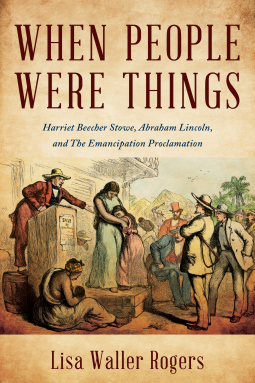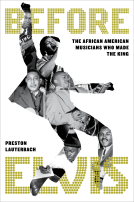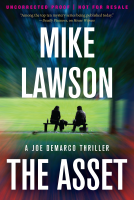
When People Were Things: Harriet Beecher Stowe, Abraham Lincoln, and the Emancipation Proclamation
by Lisa Waller Rogers
This title was previously available on NetGalley and is now archived.
Send NetGalley books directly to your Kindle or Kindle app
1
To read on a Kindle or Kindle app, please add kindle@netgalley.com as an approved email address to receive files in your Amazon account. Click here for step-by-step instructions.
2
Also find your Kindle email address within your Amazon account, and enter it here.
Pub Date Sep 01 2025 | Archive Date Nov 15 2025
Talking about this book? Use #BlackhistoryUSHistory19thCenturyUSCivilWarbiographiesofsocialactivistsabolitionistsantislaverymovement #NetGalley. More hashtag tips!
Description
During the three decades before the American Civil War, Southern slaveholders tried to end the anti-slavery movement. They exerted their influence by censoring the press and the mail, attacking and killing abolitionists, burning buildings, drafting frightening new laws and repealing others, and terrorizing and abducting Northern free Blacks. Northerners began to realize that the Slave Power would not rest until slavery was allowed to plant itself all over the nation; many stopped compromising and pushed back. This awakening was due to the efforts of visionaries who used the power of the pen, purse, pulpit, and press to expose the brutal injustices of slavery in an attempt to bring about the liberation of an enslaved people and restore the country to its original commitment of equality for all.
When People Were Things offers a humanizing lens of these disturbing times, portraying well-known Americans in new and surprising ways—activists that still inspire and energize us today—while not shying away from revealing a world often disturbed by Blackness. The book puts the lie to the argument that tries to portray America’s slave-owning past in any positive light whatsoever.
Advance Praise
When People Were Things: Harriet Beecher Stowe, Abraham Lincoln, and the Emancipation Proclamation
Publishers Weekly Review:
https://booklife.com/booklife-review/9798999409614
"This intimate epic surveys, with novelistic flair, the lives of men and women, free and enslaved, famous and forgotten, who dared to stand up against slavery in the United States in the years leading up to the Civil War, often at the risk of their own lives. In 100 brisk but rich chapters, Rogers strives to put readers into the shoes of her principal subjects, Harriet Beecher Stowe and Abraham Lincoln, but also a host of abolitionists, formerly enslaved people, and more, in the fractious years between Stowe’s birth in 1811 and Lincoln’s signing of the Emancipation Proclamation at the dawn of 1863—Stowe, Rogers notes with significant narrative and moral power, did not doubt that the president would measure up to his moment.
"Between those events, Rogers dramatizes key moments from myriad lives (among them Theodore Weld, Sojourner Truth, August Wattles, Charles Sumner, Marius Robinson, Paul Edmonson, Harriet Tubman, and many more). The storytelling is inviting and detailed, brought to life with judicious quotes and an eye toward still-pressing themes: mob violence, as decried by both young Lincoln and Stowe; the “revolutionary concept” that women “could change society”; the courage of abolitionist truth-tellers; the “monstrous moral wrong” of slavery; and a Southern-controlled Congress’s anti-democratic efforts to silence abolitionists.
"The subject matter is sweeping, the page count daunting, and the telling at times revelatory, especially when Rogers captures how life felt—and how her cast's convictions were sharpened—as the nation came to a fierce boil. At times, though, the novelistic approach works against narrative momentum and contextualization, with chapters and sections, especially in the first half, opening with breezily precise bits of declarative scene-setting about mundane happenings that readers must trust will eventually gain significance. The choice to weave in-depth biographical accounts of Stowe’s family and Lincoln’s marriage—while mostly leaving the content and wildly popular theatrical adaptations of Uncle Tom’s Cabin unexamined—leaves readers to seek that context elsewhere."
Takeaway: Intimate, epic history of Stowe, Lincoln, and the enslaved as the nation came to a boil.
Comparable Titles: Joan D. Hedrick’s Harriet Beecher Stowe: A Life, Stanley Harrold’s American Abolitionism.
Production grades
Cover: A
Design and typography: A
Illustrations: A
Editing: A-
Marketing copy: A
∞
Kirkus Reviews: (Our Verdict √ GET IT)
https://www.kirkusreviews.com/book-reviews/lisa-waller-rogers/when-people-were-things-harriet-beecher-stowe-abraham-lincoln-and-the-emancipation-proclamation/
"Rogers offers a scenic walk through a vivid, harrowing, and heartbreaking history of the abolitionist movement
"The author delivers exceptional research and fresh perspectives as she dives into the biographies of President Abraham Lincoln and author Harriet Beecher Stowe, as well as the greater history of the abolitionist movement, as they all relate to the creation and execution of the Emancipation Proclamation. It’s divided into eight chronological sections, from “Words (1775-1831)” to “Hope (1862-1863).” These are, in many ways, thematic phases, involving a list of individuals that’s quite extensive, but the author effectively shows how they all played key roles, including radical abolitionist John Brown, presidential candidate Stephen A. Douglas, activist and writer Frederick Douglass, journalist William Lloyd Garrison, public speakers Sarah and Angelina Grimké, social reformer Lucretia Mott, Secretary of State William Henry Seward, and formerly enslaved activists Sojourner Truth and Harriet Tubman. Their backgrounds and actions weave through major events that preceded the Civil War, which include the Panic of 1837, the Nat Turner rebellion, the Dred Scott vs.Sandford case, and the establishment of the Underground Railroad. Of course, the publication of Stowe’s novel Uncle Tom’s Cabin (1852) became an “abolitionist manifesto, exposing slavery for the cruel and unjust institution it was,” and, according to Lincoln, the main event that led to the Proclamation. Throughout all the various, detailed sections, the reader comes to understand how Lincoln was influenced by many others in his decision to champion the freeing of enslaved people, and they will gain a greater understanding of his declaration, on January 1, 1863, when he signed the Proclamation and stated, 'If my name ever goes into history, it will be for this act, and my whole soul is in it.'
"A raw and emotional look at the sacrifices made by those who gave all to end slavery."
∞
“In WHEN PEOPLE WERE THINGS, Lisa Waller Rogers gives us a magisterial treatment of the anti-slavery movement in America and its key players from roughly 1830 to the Emancipation Proclamation in 1863. The book is enlivened by descriptions of such bloody events as the slave insurrection led by Nat Turner, the murder spree of John Brown and his followers, and the brutal caning of Senator Charles Sumner on the Senate floor by a South Carolina congressman....Highly recommended.”
-John Oller, author of American Queen, The Rise and Fall of Kate Chase Sprague
"Readers may be surprised at how much humanity, wit and warmth runs through When People Were Things. Rogers’ vivid writing features real people who, whatever their failings and foibles, had moral courage and used it."
∞
-Nancy Koester, author of Harriet Beecher Stowe: A Spiritual Life, and We Will Be Free: The Life and Faith of Sojourner Truth.
∞
"Lisa Waller Rogers' storytelling brilliance lies in her ability to humanize historical figures as multidimensional individuals grappling with moral complexities, personal struggles, and the weight of their times....This is historical writing at its finest..."
-Emma Harris, 2024 Gilder Lehrman Maryland State American History Teacher of the Year
Marketing Plan
book available on Amazon, Ingram and any sites such as Walmart, Barnes and Noble, Kobo, Baker & Taylor, that use Ingram as its distributor or you can ask local bookstore to order for you. Librarians and history educators may be interested in reading. Available in ebook, paperback, and hardbound copies. Bookseller can return unsold books and receive the regular discount at Ingram.
Author, a history graduate from the University of Texas at Austin, has received awards and recognition for her five published books, and praise for her storytelling skills. She is a former educational consultant to educational publishers and a former classroom history teacher.
Available Editions
| EDITION | Paperback |
| ISBN | 9798999409614 |
| PRICE | |
| PAGES | 680 |
Links
Available on NetGalley
Average rating from 13 members
Featured Reviews
When People Were Things is a compelling, in-depth look at the anti-slavery movement in the three decades leading up to the Emancipation Proclamation, shedding light on the activists who fought to end one of the darkest chapters in American history. Author Lisa Waller Rogers is a masterful storyteller, bringing these courageous activists to life with nuance and humanity.
Rogers not only explores prominent figures in the abolitionist movement but also highlights lesser-known enslaved people and women whose contributions were vital to the cause. I especially appreciated the inclusion of so many women’s voices, which added depth and breadth to the narrative.
Told in short, highly readable chapters, this meticulously researched book doesn’t shy away from the brutal realities of slavery. Yet, amid the horrors, Rogers emphasizes the resilience, love, and dignity of real people who endured and resisted unimaginable circumstances. Her attention to detail makes these historical figures feel fully dimensional and deeply human.
When People Were Things helped me connect the dots between key historical moments and figures, deepening my understanding of this era of history. I highly recommend this powerful read.
 Bruce R, Reviewer
Bruce R, Reviewer
A well researched, well written, engaging and informative account of the abolitionist movement in the United States leading up to the Emancipation Proclamation. I was enraptured from the first chapter and could barely put it down. I learned so much that I didn't know, especially about Harriet Beecher Stowe, Harriet Tubman, John Brown, and the initial challenges of the Civil War. Highly recommended
Thanks to NetGalley and Barrel Cactus Press, Inc. for an advanced reader copy.
When People Were Things: Harriet Beecher Stowe, Abraham Lincoln, and the Emancipation Proclamation by Lisa Waller Rogers ...
from the blurb "During the three decades before the American Civil War, Southern slaveholders tried to end the anti-slavery movement. They exerted their influence by censoring the press and the mail, attacking and killing abolitionists, burning buildings, drafting frightening new laws and repealing others, and terrorizing and abducting Northern free Blacks. Northerners began to realize that the Slave Power would not rest until slavery was allowed to plant itself all over the nation; many stopped compromising and pushed back. This awakening was due to the efforts of visionaries who used the power of the pen, purse, pulpit, and press to expose the brutal injustices of slavery in an attempt to bring about the liberation of an enslaved people and restore the country to its original commitment of equality for all."
This was a well-written dive into not only the primary, but secondary, and tertiary players that drove the change(s) that resulted in the Emancipation Proclamation. Along the way I learned quite a few things that I had never known and enjoyed the way that these more unknown narratives helped drive the pace. "When People..." features short chapters that make it an easy read and keep you engaged in the evolving story, even if you know where it's going. The disparate stories helped set the stage for the Civil War so well - placing you into the local mindsets and against the various forces on all sides, with particular attention paid to the female voices and their place. This attention to the female voice and their requisite struggle is at the heart of this book, imo. Highly recommended.
When People Were Things is a gripping look at the anti-slavery movement before the Emancipation Proclamation. Lisa Waller Rogers brings activists both famous and forgotten to life, highlighting resilience, courage, and the vital role of women in history. Hard hitting, human, and unforgettable. Please read this the chapters are short its very reader friendly. Thank you to Barrel Cactus Press and NetGalley I received an advance review copy for free, and I am leaving this review voluntarily.
A lengthy book diving into key and support figures involved in the Emancipation Proclamation. The book reads as a novel but covers an incredibly varied selection of people and circumstances with grace and honesty.
The book has quite a slow start but once you get passed the first 100 pages things pick up and you become quite engrossed in the story being told. The book is clearly a labour of love by the author that is excellently researched, and presented. There was a lot to learn that I didn’t know.
Edit
 Reviewer 1842336
Reviewer 1842336
I love history. It put me through the wringer but it goes back to the sankofa proverb. Everyone needs to read this book
 Carolyn H, Reviewer
Carolyn H, Reviewer
This book was raw and real . It is shameful that humans treated other humans with such hatred. And now 2025 their are white racist, demonic white people who would jump at the chance of owning slaves today. Great author.
I have been working my way through this book with an eye toward how to integrate it into curriculum in today's climate, and as a "buddy" to fictional books. I think it succeeds as a source to ungird the truth the slavery was a horrendous institution in American history and that it was not unanimously supported by Christians and white people at large. To that end, this book should have a place in libraries and reading lists for scholars of American history.
 Reviewer 1868734
Reviewer 1868734
It's been awhile since I've read historical nonfiction, but was intrigued by the subject matter in this book by Lisa Waller Rogers. It is a very well written and thoroughly researched. I didn't know much about Harriet Beecher Stowe prior to reading this book and felt like the author did a fantastic job describing her origin story and how she came about to write Uncle Tom's Cabin. It was heartening to read about the number of players in the anti-slavery movement and how they worked together to bring about change. Abraham Lincoln's trajectory and how he came to pen the Emancipation Proclamation was also highlighted in the story and while I did know more about this subject matter, there were a number of things I learned along the way. The chapters are short and digestable and the writing is familiar and does not try to be overly scholarly in its attempt to pull the covers back on what was going on at the time.
Lisa Waller Rogers wrote a wonderful book of American history. When PeopleWere Things: Harriet Beecher Stowe, Abraham Lincoln, and the Emancipation Proclamation showed us the true history of those who fought for the end of slavery. Harriet Beecher Stowe was a Christian woman who wanted to see the abolishment of slavery and used her talent of writing to help bring awareness to it and the horribleness of it. She wrote Uncle Tom’s Cabin during this time. She believed that God gives each of us freedoms for life. In believing this, no person had the right to make some other person property. Abraham Lincoln believed the same. Abraham Lincoln believed that the Declaration of Independence already proved our founding and founding fathers wanted an ending to slavery and believed so, because it says that all men are created equal. And that it was given to us by God. So he fought to make it possible for all just as God intended. It is a very good, powerful and important truth of our nation, the United States of America 🇺🇸. Recommend for all to read, especially anyone who loves history, especially American history. Thank you Net Galley for the arc and to the publishers and author as well.
Readers who liked this book also liked:
Marie Bostwick
Historical Fiction, Literary Fiction, Women's Fiction


















